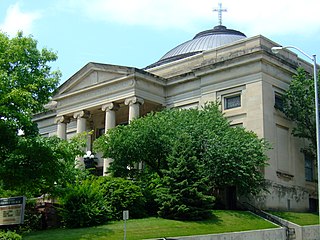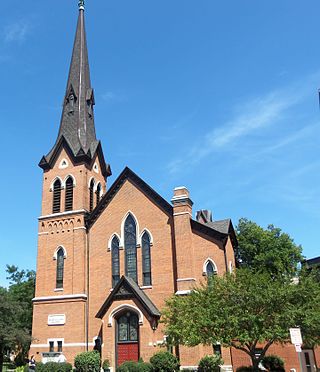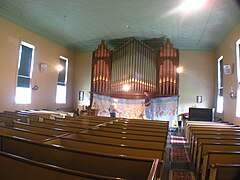
The Soul Harvest Ministries is located at 16300 Woodward Avenue in Highland Park, Michigan. It was built in 1916 as the First United Methodist Church and listed on the National Register of Historic Places in 1982.

Hyde Park Dutch Reformed Church is located on US 9 in the center of Hyde Park, New York, United States, just north of the post office and the junction with Market Street at the center of town. It is a complex of several buildings on a 2-acre (0.81 ha) lot.

The First Congregational Church is a historic church in Orwell, Vermont. The current meeting house was built in 1843, and is one of state's best examples of Greek Revival ecclesiastical architecture. It was listed on the National Register of Historic Places in 2001.

The Grand Isle United Methodist Church, formerly the Congregational Church—Grand Isle, is a historic church in Grand Isle, Vermont. Built in 1853–54, it is a well-preserved local example of Greek Revival architecture and the town's oldest surviving church building. Originally built for a Congregationalist group, it is now home to a United Methodist Church congregation. The church was listed on the National Register of Historic Places in 2001.

The East Village Meetinghouse, also known as the Old Brick Church, is a historic church at 55 Vermont Route 14 in East Montpelier, Vermont. Built in 1833-34, it is a fine local example of Greek Revival architecture, and has been the focal point of the historic East Village for most of its history. It was listed on the National Register of Historic Places in 1980.

St. Mary's Catholic Church was a parish of the Diocese of Davenport. The church building is located in the west end of Davenport, Iowa, United States, at the corner of Fillmore and W. 6th Streets. It is listed on the National Register of Historic Places as St. Mary's Roman Catholic Church Complex. The designation includes the church building and rectory on the west side of Fillmore Street, and the former parochial school building and convent on the east side. A former school building operated by the parish two blocks north on West Eighth Street is also on the National Register and is listed as St. Mary's Academy. The parish ceased operations in July 2020 when it was merged into St. Anthony's Church downtown. The parish campus is being acquired by the nonprofit organization Humility Homes & Services, which is operated by the Congregation of the Humility of Mary.

The Church of Our Saviour is a historic Episcopal parish in the village of Mechanicsburg, Ohio, United States. Founded in the 1890s, it is one of the youngest congregations in the village, but its Gothic Revival-style church building that was constructed soon after the parish's creation has been named a historic site.

St. John's United Methodist Church is located in central Davenport, Iowa, United States. It was listed on the National Register of Historic Places in 1983.

St. Paul's Episcopal Church is a parish church in the Diocese of Iowa. The church is located in Durant, Iowa, United States. The church building and parish hall have been listed on the National Register of Historic Places since 1985.

First United Methodist Church is located in downtown Des Moines, Iowa, United States. It has been listed on the National Register of Historic Places since 1984 as First Methodist Episcopal Church, which is its original name.

Trinity United Methodist Church is located in Des Moines, Iowa, United States. It was listed on the National Register of Historic Places in 1998 as Trinity Methodist Episcopal Church, which was its previous name.

First Presbyterian Church is a Presbyterian Church (USA) church located in Muscatine, Iowa, United States. It, along with the attached Sunday School building, were listed on the National Register of Historic Places in 1977.

St. Paul's United Methodist Church is located in downtown Cedar Rapids, Iowa, United States. The Louis Sullivan-designed building has been individually listed on the National Register of Historic Places since 1985. In 2000 it was included as a contributing property in the Second and Third Avenue Historic District.

Congregational United Church of Christ is located in the downtown area of Iowa City, Iowa, United States near the campus of the University of Iowa. The congregation was organized in 1856 and the church building was listed on the National Register of Historic Places in 1973. In 2004 it was included as a contributing property in the Jefferson Street Historic District.

Augustana Lutheran Church is an Evangelical Lutheran Church in America congregation located in Sioux City, Iowa, United States. The church building was listed on the National Register of Historic Places in 2006 as Swedish Evangelical Lutheran Augustana Church.

The Historic Presbyterian Community Center, formerly the First Presbyterian Church, is a former church building in the city of Madison, in the northeastern part of the state of Nebraska, in the Midwestern United States.

Clermont Public School, also known as Larrabee School, is a historic building located in Clermont, Iowa, United States. The school was named for its patron, William Larrabee, who was the twelfth Governor of Iowa. Larrabee himself had been a teacher in Allamakee County, Iowa. During his time in the Iowa Senate and as governor he championed education reform. He used as one of his campaign slogans: "A schoolhouse on every hill and no saloons in the valley." Larrabee and his wife Anna studied school buildings for a number of years, and were involved in planning this building. They hired Cedar Rapids, Iowa architect Charles A. Dieman to design the structure. R.A. Wallace, a contractor from Cedar Rapids, was responsible for its construction. The building was over-engineered as Larrabee insisted that the strength of everything be doubled. The bricks were produced, and the limestone was quarried, locally. It is a two-story Neoclassical building that features a classical portico, brick pilasters with Doric capitals, and two arched dormers on the hipped roof.

Cottage Grove Avenue Presbyterian Church is a historic building located in Des Moines, Iowa, United States. It was listed on the National Register of Historic Places in 2016.

Lisbon United Methodist Church is located in Lisbon, Iowa, United States. It was listed on the National Register of Historic Places in 2016.

























